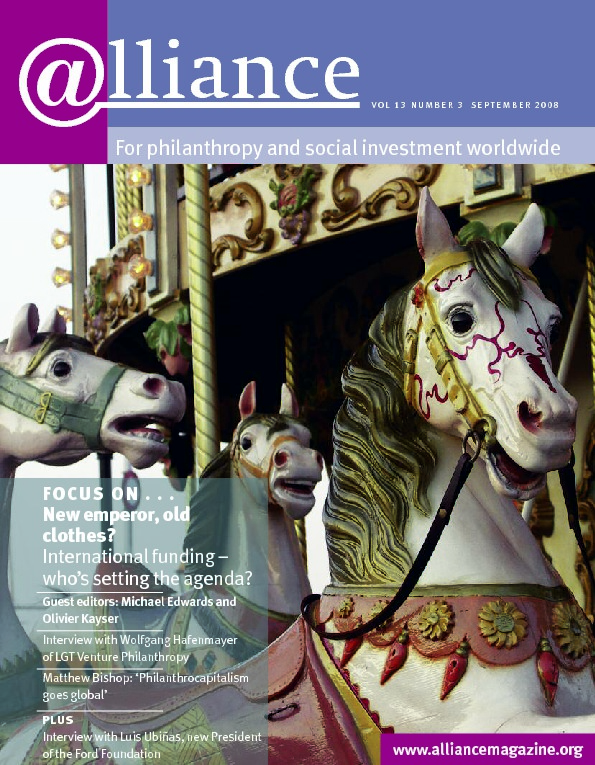For those of us who work with community foundations, particularly in emerging countries, moments of reflection are rare. We are so busy performing the ‘balancing act’, as Dorothy Reynolds puts it, that we rarely have a chance to think about the broader issues for our field.
That is why this book is so precious. It puts together a historical record of the emergence and development of community foundations around the world, with descriptions of practical experiences of community foundations working in different contexts, and provides technical guidance on governance and planning.
The authors have organized the book into four major themes, although I identified other common threads that could have produced a different classification of the content. That is clear evidence of the breadth and depth of the book.
The first section presents articles on the mission, vision and values of community foundations. It begins with a wonderful and detailed description by Peter Walkenhorst of the spread of the community foundation concept around the world, a valuable historical record for future generations of community foundation leaders. The articles by Peter Hero and Emmett Carson provide an extraordinarily broad and culturally sensitive vision of the new roles of the community foundation, questioning its neutrality and defending its role in promoting social justice. Bernardino Casadei and Gaynor Humphries describe the emergence of community foundations in Italy and England respectively, and their articles reflect well the cultural and social diversity of Europe.
The second section focuses on the work of community foundations in building assets and community. It discusses the importance of non-financial assets in measuring the success of a community foundation. Barbara McInnes and Monica Patten share the richness of their experience in Canada in developing assets related to money, knowledge and relationships, while Laura Arrilagada describes the innovative experience of community philanthropy incubated at a community foundation. Also in this section, Jiri Barta presents an interesting account of the Czech Republic’s experience of diaspora philanthropy.
The third section discusses community foundations’ civic leadership role. Lewis Feldstein, Avila Kilmurray and Vadim Samorodov write about the important role played by community foundations in the US, Northern Ireland and Russia in strengthening and rebuilding civil society. Andrew Morikawa discusses the importance of good governance in community foundations and offers a theoretical framework to improve the performance of boards of trustees and staff.
The final section of the book explores the future of community foundations. Helmut Anheier and Diana Leat present a new conceptual framework for community foundations, based on the concept of ‘creative philanthropy’, while Joe Lumarda discusses the need for community foundations to take a global view of events in order to better inform their financial and programmatic decisions. Lucy Bernholz, based on her well-known work On the Brink of New Promise, offers a road map to think about how community foundations can create value and meaning for ever-changing communities.
This brief summary obviously does not capture all the information, practical guidance and inspiration provided by the authors, who possess the rare combination of academic credentials, hands-on experience and international exposure that true leaders and mentors are made of. Fortunately, two Peters on different sides of the Atlantic (Hero and Walkenhorst) were able to put their contributions together and share them with all of us in the community foundation world.
It would be an understatement to say I strongly recommend this book to community foundation leaders. I read it during my vacation and was so inspired by the stories told by the authors and so energized by the ideas that stemmed from their experiences that I found myself looking forward to going back to work. Local Mission – Global Vision is a book which will be on my desk, to feed me with knowledge and advice. But most importantly it will remind me that building a community foundation is not a lonely journey, that I can count on colleagues all over the world who are committed to expanding the meaning and impact of community foundations across countries and boundaries.
Lucia Dellagnelo is Founder and CEO of ICom, an emerging community foundation in Brazil. Email lucia@icomfloripa.org.br
Local Mission – Global Vision: Community foundations in the 21st century
Peter deCourcy Hero and Peter Walkenhorst
Foundation Center/TCFN $34.95
ISBN 9781595422040
To order
http://foundationcenter.org/marketplace






Comments (0)